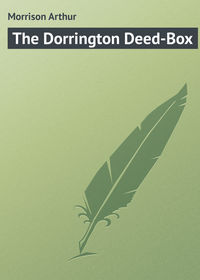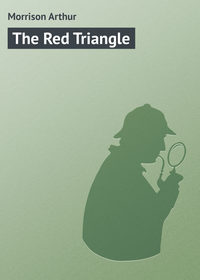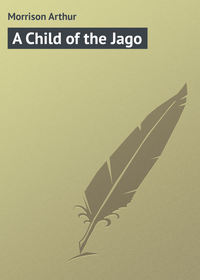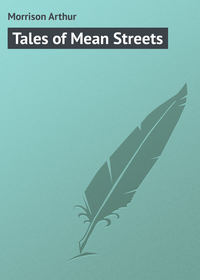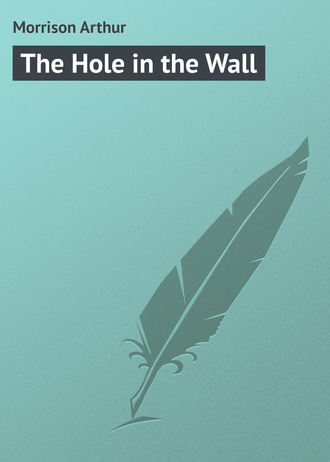 полная версия
полная версияThe Hole in the Wall
But, meantime, his chief patron was grown so abstracted from considerations of the necessities of genius, so impervious to hints, so deaf to all suggestion of grant-in-aid, that Mr. Cripps was driven to a desperate and dramatic stroke. One morning he appeared in the bar carrying the board for the sign; no tale of a board, no description or account of a board, no estimate or admeasurement of a board; but the actual, solid, material board itself.
By what expedient he had acquired it did not fully appear, and, indeed, with him, cash and credit were about equally scarce. But upon one thing he most vehemently insisted: that he dared not return home without the money to pay for it. The ravening creditor would be lying in wait at the corner of his street.
Mr. Cripps's device for breaking through Captain Nat's abstraction succeeded beyond all calculation. For my grandfather laid hands on Mr. Cripps and the board together, and hauled both straightway into the skippers' parlour at the back.
"There's the board," he said with decision, "an' there's you. Where's the paints an' brushes?"
Mr. Cripps's stock of paints was low, it seemed, or exhausted. His brushes were at home and – his creditor was at the corner of the street.
"If I could take the proceeds" – Mr. Cripps began; but Grandfather Nat interrupted. "Here's you, an' here's the board, an' we'll soon get the tools: I'll send for 'em or buy new. Here, Joe! Joe'll get 'em. You say what you want, an' he'll fetch 'em. Here you are, an' here you stick, an' do my signboard!"
Mr. Cripps dared not struggle for his liberty, and indeed a promise of his meals at the proper hours reconciled him to my grandfather's defiance of Magna Charta. So the skipper's parlour became his studio; and there he was left in company with his materials, a pot of beer, and a screw of tobacco. I much desired to see the painting, but it was ruled that Mr. Cripps must not be disturbed. I think I must have restrained my curiosity for an hour at least, ere I ventured on tip-toe to peep through a little window used for the passing in and out of drinks and empty glasses. Here my view was somewhat obstructed by Mr. Cripps's pot, which, being empty, he had placed upside down in the opening, as a polite intimation to whomsoever it might concern; but I could see that Mr. Cripps's labours having proceeded so far as the selection of a convenient chair, he was now taking relaxation in profound slumber. So I went away and said nothing.
When at last he was disturbed by the arrival of his dinner, Mr. Cripps regained consciousness with a sudden bounce that almost deposited him on the floor.
"Conception," he gasped, rubbing his eyes, "conception, an' meditation, an' invention, is what you want in a job like this!"
"Ah," replied my grandfather grimly, "that's all, is it? Then common things like dinner don't matter. Perhaps Joe'd better take it away?"
But it seemed that Mr. Cripps wanted his dinner too. He had it; but Grandfather Nat made it clear that he should consider meditation wholly inconsistent with tea. So that, in course of the afternoon, Mr. Cripps was fain to paint the board white, and so earn a liberal interval of rest, while it dried. And at night he went away home without the price of the board, but, instead, a note to the effect that the amount was payable on application to Captain Kemp at the Hole in the Wall, Wapping. This note was the production, after three successive failures, of my own pen, and to me a matter of great pride and delight; so that I was sadly disappointed to observe that Mr. Cripps received it with emotions of a wholly different character.
Next morning Mr. Cripps returned to durance with another pot and another screw of tobacco. Grandfather Nat had business in the Minories in the matter of a distiller's account; and for this reason divers injunctions, stipulations, and warnings were entered into and laid upon Mr. Cripps before his departure. As for instance: —
It was agreed that Mr. Cripps should remain in the skipper's parlour.
Also (after some trouble) that no exception should be made to the foregoing stipulation, even in the event of Mr. Cripps feeling it necessary to go out somewhere to study a brick wall (or the hole in it) from nature.
Nor even if he felt overcome by the smell of paint.
Agreed, however: that an exception be granted in the event of the house being on fire.
Further: this with more trouble: that one pot of beer before dinner is enough for any man seriously bent on the pursuit of art.
Moreover: that the board must not be painted white again.
Lastly: that the period of invention and meditation be considered at an end; and that sleep on Mr. Cripps's part be regarded as an acknowledgment that meals are over for the day.
These articles being at length agreed and confirmed, and Mr. Cripps having been duly witnessed to make certain marks with charcoal on the white board, as a guarantee of good faith, Grandfather Nat and I set out for the Minories.
His moodiness notwithstanding, it was part of his new habit to keep me near him as much as possible, day and night, with a sort of wistful jealousy. So we walked hand in hand over the swing bridge, past Paddy's Goose, into the Highway, and on through that same pageant of romance and squalor. The tradesmen at their doors saluted Grandfather Nat with a subdued regard, as I had observed most people to do since the news of Juno's wreck. Indeed that disaster was very freely spoken of, all along the waterside, as a deliberate scuttling, and it was felt that Captain Nat could lay his bereavement to something worse than the fair chance of the seas. Such things were a part of the daily talk by the Docks, and here all the familiar features were present; while it was especially noted that nothing had been seen of Viney since the news came. He meant to lie safe, said the gossips; since, as a bankrupt, he stood to gain nothing by the insurance.
One tradesman alone, a publican just beyond Blue Gate, greeted my grandfather noisily, but he was thoughtless with the pride of commercial achievement. For he was enlarging his bar, a large one already, by the demolition of the adjoining shop, and he was anxious to exhibit and explain his designs.
"Why, good mornin', Cap'en," cried the publican, from amid scaffold poles and brick-dust. "You're a stranger lately. See what I'm doin'? Here: come in here an' look. How's this, eh? Another pair o' doors just over there, an' the bar brought round like so, an' that for Bottle an' Jug, and throw the rest into Public Bar. Eh?"
The party wall had already been removed, and the structure above rested on baulks and beams. The bar was screened off now from the place of its enlargement by nothing but canvas and tarpaulin, and my grandfather and his acquaintance stood with their backs to this, to survey the work of the builders.
Waiting by my grandfather's side while he talked, I was soon aware that business was brisk in the bar beyond the canvas; and I listened idly to the hum of custom and debate. Suddenly I grew aware of a voice I knew – an acrid voice just within the canvas.
"Then if you're useless, I ain't," said the voice, "an' I shan't let it drop." And indeed it was Mrs. Grimes who spoke.
I looked up quickly at Grandfather Nat, but he was interested in his discussion, and plainly had not heard. Mrs. Grimes's declaration drew a growling answer in a man's voice, wholly indistinct; and I found a patch in the canvas, with a loose corner, which afforded a peep-hole.
Mrs. Grimes was nearest, with her back to the canvas, so that her skirts threatened to close my view. Opposite her were two persons, in the nearest of whom I was surprised to recognise the coarse-faced woman I had seen twice before: once when she came asking confused questions to Grandfather Nat about the man who sold a watch, and once when she fainted at the inquest, and Mrs. Grimes was too respectable to stay near her. The woman looked sorrowful and drawn about the eyes and cheeks, and she held to the arm of a tall, raw-boned man. His face was seamed with ragged and blistered skin, and he wore a shade over the hollows where now, peeping upward, I could see no eyes, but shut and sunken lids; so that at first it was hard to recognise the fellow who had been talking to this same coarse-faced woman by Blue Gate, when she left him to ask those questions of my grandfather; and indeed I should never have remembered him but that the woman brought him to my mind.
It was this man whose growling answer I had heard. Now Mrs. Grimes spoke again. "All my fault from the beginning?" she said. "O yes, I like that: because I wanted to keep myself respectable! My fault or not, I shan't wait any longer for you. If I ain't to have it, you shan't. An' if I can't get the money I can get something else."
The man growled again and swore, and beat his stick impotently on the floor. "You're a fool," he said. "Can't you wait till I'm a bit straight? You an' your revenge! Pah! When there's money to be had!"
"Not much to be had your way, it seems, the mess you've made of it; an' precious likely to do any better now, ain't you? An' as to money – well there's rewards given – "
Grandfather Nat's hand fell on my cap, and startled me. He had congratulated his friend, approved his plans, made a few suggestions, and now was ready to resume the walk. He talked still as he took my hand, and stood thus for a few minutes by the door, exchanging views with the publican on the weather, the last ships in, and the state of trade. I heard one more growl, louder and angrier than the others, from beyond the screen, and a sharper answer, and then there was a movement and the slam of a door; and I got over the step, and stretched my grandfather's arm and my own to see Mrs. Grimes go walking up the street.
When we were free of the publican, I told Grandfather Nat that I had seen Mrs. Grimes in the bar. He made so indifferent a reply that I said nothing of the conversation I had overheard; for indeed I knew nothing of its significance. And so we went about our business.
CHAPTER XXVI
STEPHEN'S TALE
On our way home we were brought to a stand at the swing bridge, which lay open to let through a ship. We were too late for the perilous lock; for already the capstans were going, and the ship's fenders were squeaking and groaning against the masonry. So we stood and waited till fore, main, and mizzen had crawled by; and then I was surprised to observe, foremost and most impatient among the passengers on the opposite side, Mr. Cripps.
The winches turned, and the bridge swung; and my surprise grew, when I perceived that Mr. Cripps made no effort to avoid Grandfather Nat, but hurried forward to meet him.
"Well," said my grandfather gruffly, "house on fire?"
"No, sir – no. But I thought – "
"Sign done?"
"No, Cap'en, not done exactly. But I just got curious noos, an' so I come to meet you."
"What's the news?"
"Not p'raps exactly as you might say noos, sir, but information – information that's been transpired to me this mornin'. More or less unique information, so to say, – uncommon unique; much uniquer than usual."
With these repetitions Mr. Cripps looked hard in my grandfather's eyes, as one does who wishes to break news, or lead up to a painful subject. "What's it all about?" asked Grandfather Nat.
"The Juno."
"Well?"
"She was scuttled wilful, Cap'en Kemp, scuttled wilful by Beecher. It's more'n rumour or scandal: it's plain evidence."
My grandfather looked fixedly at Mr. Cripps. "What's the plain evidence?" he asked.
"That chap that's been so much in the bar lately," Mr. Cripps answered, his eyes wide with the importance of his discovery. "The chap that soaks so heavy, an' shouts at any one you order out. He was aboard the Juno on the voyage out, an' he deserted at Monte Video to a homeward bound ship."
"Then he doesn't know about the wreck." I thought my grandfather made this objection almost eagerly.
"No, Cap'en; but he deserted 'cos he said he preferred bein' on a ship as was meant to come back, an' one as had some grub aboard – him an' others. Beecher tried to pile 'em up time an' again; an' says the chap – Conolly's his name – says he, anything as went wrong aboard the Juno was Beecher's doin'; which was prophesied in the fo'c'sle a score o' times 'fore she got to Monte Video. An' – an' Conolly said more." Mr. Cripps stole another sidelong glance at Grandfather Nat. "Confidential to me this mornin', Conolly said more."
"What?"
"He said it was the first officer, your son, Cap'en, as prevented the ship bein' piled up on the voyage out, an' all but knocked Beecher down once. An' he said they was near fightin' half the time he was with 'em, an' he said – surprisin' solemn too – solemn as a man could as was half drunk – that after what he'd seen an' heard, anything as happened to the first mate was no accident, or anything like it. That's what he said, cap'en, confidential to me this mornin'."
We were walking along together now; and Mr. Cripps seemed puzzled that his information produced no more startling effect on my grandfather. The old man's face was pale and hard, but there was no sign of surprise; which was natural, seeing that this was no news, as Mr. Cripps supposed, but merely confirmation.
"He said there was never any skipper so partic'ler about the boats an' davits bein' kep' in order as Beecher was that trip," Mr. Cripps proceeded. "An' he kep' his own life-belt wonderful handy. As for the crew, they kep' their kit-bags packed all the time; they could see enough for that. An' he said there was some as could say more'n he could."
We came in view of the Hole in the Wall, and Mr. Cripps stopped short. "He don't know I'm tellin' you this," he said. "He came in the skipper's room with a drink, an' got talkin' confidential. He's very close about it. You know what sailors are."
Grandfather Nat frowned, and nodded. Indeed nobody knew better the common sailor-man's horror of complications and "land-shark" troubles ashore: of anything that might lead to his being asked for responsible evidence, even for his own protection. It gave impunity to three-quarters of the iniquity practised on the high seas.
"An' then o' course he's a deserter," Mr. Cripps proceeded. "So I don't think you'd better say I told you, cap'en – not to him. You can give information – or I can – an' then they'll make him talk, at the Old Bailey; an' they'll bring others."
Grandfather Nat winced, and turned away. Then he stopped again and said angrily: "Damn you, don't meddle! Keep your mouth shut, an' don't meddle."
Mr. Cripps's jaw dropped, and his very nose paled. "But – but – " he stammered, "but, Cap'en, it's murder! Murder agin Beecher an' Viney too! You'll do something, when it's your own son! Your own son. An' it's murder, Cap'en!"
My grandfather went two steps on his way, with a stifled groan. "Murder!" he muttered, "murder it is, by the law of England!"
Mr. Cripps came at his heels, very blank in the face. Suddenly my grandfather turned on him again, pale and fierce. "Shut your mouth, d'ye hear? Stow your slack jaw, an' mind your own business, or I'll – "
Grandfather Nat lifted his hand; and I believe nothing but a paralysis of terror kept Mr. Cripps from a bolt. Several people stopped to stare, and the old man saw it. So he checked his wrath and walked on.
"I'll see that man," he said presently, flinging the words at Mr. Cripps over his shoulder. And so we reached the Hole in the Wall.
Mr. Cripps sat speechless in the bar and trembled, while Grandfather Nat remained for an hour in the skipper's parlour with Conolly the half-drunken. What they said one to another I never learned, nor even if my grandfather persuaded the man to tell him anything; though there can be no doubt he did.
For myself, I moved uneasily about the bar-parlour, and presently I slipped out into the alley to gaze at the river from the stair-head. I was troubled vaguely, as a child often is who strives to analyse the behaviour of his elders. I stared some while at the barges and the tugs, and at Bill Stagg's boat with its cage of fire, as it went in and about among the shipping; I looked at the bills on the wall, where new tales of men and women Found Drowned displaced those of a week ago; and I fell again into the wonderment and conjecture they always prompted; and last I turned up the alley, though whether to look out on the street or to stop at the bar-parlour door, I had not determined.
As I went, I grew aware of a tall, florid man with thick boots and very large whiskers, who stood at the entry, and regarded me with a wide and ingratiating smile. I had some cloudy remembrance of having seen him before, walking in the street of Wapping Wall; and, as he seemed to be coming to meet me, I went on past the bar-parlour door to meet him.
"Ah!" he said with a slight glance toward the door, "you're a smart fellow, I can see." And he patted my head and stooped. "Now I've got something to show you. See there!"
He pulled a watch from his pocket and opened it. I was much interested to see that the inward part swung clear out from the case, on a hinge, exactly as I had seen happen with another watch on my first evening at the Hole in the Wall. "That's a rum trick, ain't it?" observed the stranger, smiling wider than ever.
I assented, and thanked him for the demonstration.
"Ah," he replied, "you're as clever a lad as ever I see; but I lay you never see a watch like that before?"
"Yes, I did," I answered heartily. "I saw one once."
"No, no," said the florid man, still toying with the watch, "I don't believe that – it's your gammon. Why, where did you see one?"
He shot another stealthy glance toward the bar-parlour door as he said it, and the glance was so unlike the smile that my sleeping caution was alarmed. I remembered how my grandfather had come by the watch with the M on the back; and I remember his repeated warnings that I must not talk.
" – Why, where did you see one?" asked the stranger.
"In a man's hand," I said, with stolid truth.
He looked at me so sharply through his grin that I had an uncomfortable feeling that I had somehow let out the secret after all. But I resolved to hold on tight.
"Ha! ha!" he laughed, "in a man's hand, of course! I knew you was a smart one. Mine hasn't got any letter on the back, you see."
"No," I answered with elaborate indifference; "no letter." And as I spoke I found more matter of surprise. For if I had eyes in my head – and indeed I had sharp ones – there was Mrs. Grimes in a dark entry across the street, watching this grinning questioner and me.
"Some have letters on the back," said the questioner. "Mine ain't that sort. What sort – "
Here Joe the potman dropped, or knocked over, something in the bar-parlour; and the stranger started.
"I think I'm wanted indoors," I said, moving off, glad of the interruption. "Good-bye!"
The florid stranger rose and walked off at once, with a parting smile. He turned at the corner, and went straight away, without so much as a look toward the entry where Mrs. Grimes was. I fancied he walked rather like a policeman.
CHAPTER XXVII
IN THE BAR-PARLOUR
Dan Ogle, blinded and broken, but silent and saving his revenge: Musky Mag, stricken and pitiable, but faithful even if to death: Henry Viney, desperate but fearful, and urgently needy: these three skulked at bay in dark holes by Blue Gate.
Sullen and silent to doggedness, Ogle would give no word to the hospital doctors of how his injury had befallen; and in three days he would brook confinement no longer, but rose and broke away, defiant of persuasion, to grope into the outer world by aid of Mag's arm. Blind George was about still, but had scarcely been near the Highway except at night, when, as he had been wont to boast, he was as good as most men with sound eyes. It was thought that he spent his days over the water, as would be the way of one feeling the need of temporary caution. It did not matter: that could rest a bit. Blind George should be paid, and paid bitter measure; but first the job in hand, first the scheme he had interrupted; first the money.
Here were doubt and difficulty. Dan Ogle's plan of murder and comprehensive pillage was gone by the board; he was next to helpless. It was plain that, whatever plan was followed, Viney must bear the active part; Dan Ogle raved and cursed to find his partner so unpractised a ruffian, so cautious and doubtful a confederate.
Mrs. Grimes made the matter harder, and it was plain that the thing must be either brought to a head or wholly abandoned, if only on her account. For she had her own idea, with her certain revenge on Captain Nat, and a contingent reward; furthermore, she saw her brother useless. And things were brought to a head when she would wait no more, but carried her intrigue to the police.
Nothing but a sudden move would do now, desperate as it might be; and the fact screwed Viney to the sticking-place, and gave new vigour to Ogle's shaken frame. After all, the delay had not been great – no more than a few days. Captain Nat suspected nothing, and the chances lay that the notes were still in hand, as they had been when Ogle's sister last saw them; for he could afford to hold them, and dispose of them at a later and safer time. The one danger was from this manœuvre of Mrs. Grimes: if the police thought well enough of her tale to act without preliminary inquiry, they might be at the Hole in the Wall with a search-warrant at any moment. The thing must be done at once – that very night.
Musky Mag had never left Dan's side a moment since she had brought him from the hospital; now she was thrust aside, and bidden to keep to herself. Viney took to pen, ink and paper; and the two men waited impatiently for midnight.
It was then that Viney, with Ogle at his elbow, awaited the closing of the Hole in the Wall, hidden in the dark entry, whence Mrs. Grimes had watched the plain-clothes policeman fishing for information a few hours earlier. The customers grew noisier as the hour neared; and Captain Nat's voice was heard enjoining order once or twice, ere at last it was raised to clear the bar. Then the company came out, straggling and staggering, wrangling and singing, and melted away into the dark, this way and that. Mr. Cripps went east, the pale pensioner west, each like a man who has all night to get home in; and the potman, having fastened the shutters, took his coat and hat, and went his way also.
There was but one other tavern in sight, and that closed at the same time as the Hole in the Wall; and since none nearer than Paddy's Goose remained open till one, Wapping Wall was soon dark and empty. There were diamond-shaped holes near the top of the shutters at the Hole in the Wall, and light was visible through these: a sign that Captain Nat was still engaged in the bar. Presently the light dulled, and then disappeared: he had extinguished the lamps. Now was the time – while he was in the bar-parlour. Viney came out from the entry, pulling Ogle by the arm, and crossed the street. He brought him to the court entrance, and placed his hand on the end post.
"This is the first post in the court," Viney whispered. "Wait here while I go. We both know what's to do."
Viney tip-toed to the bar-parlour door, and tapped. There was a heavy footstep within, and the door was flung open. There stood Captain Nat with the table-lamp in his hand. "Who's that?" said Captain Nat. "Come into the light."
Viney took a deep breath. "Me," he answered. "I'll come in; I've got something to say."
He went in side-foremost, with his back against the door-post, and Captain Nat turned slowly, each man watching the other. Then the landlord put the lamp on the table, and shut the door. "Well," he said, "I'll hear you say it."
There was something odd about Captain Nat's eyes: something new, and something that Viney did not like. Hard and quiet; not anger, it would seem, but some-thing indefinable – and worse. Viney braced himself with another inspiration of breath.
"First," he said, "I'm alone here, but I've left word. There's a friend o' mine not far off, waiting. He's waiting where he can hear the clock strike on Shadwell Church, just as you can hear it here; an' if I'm not back with him, safe an' sound, when it strikes one, he's going to the police with some papers I've given him, in an envelope."




